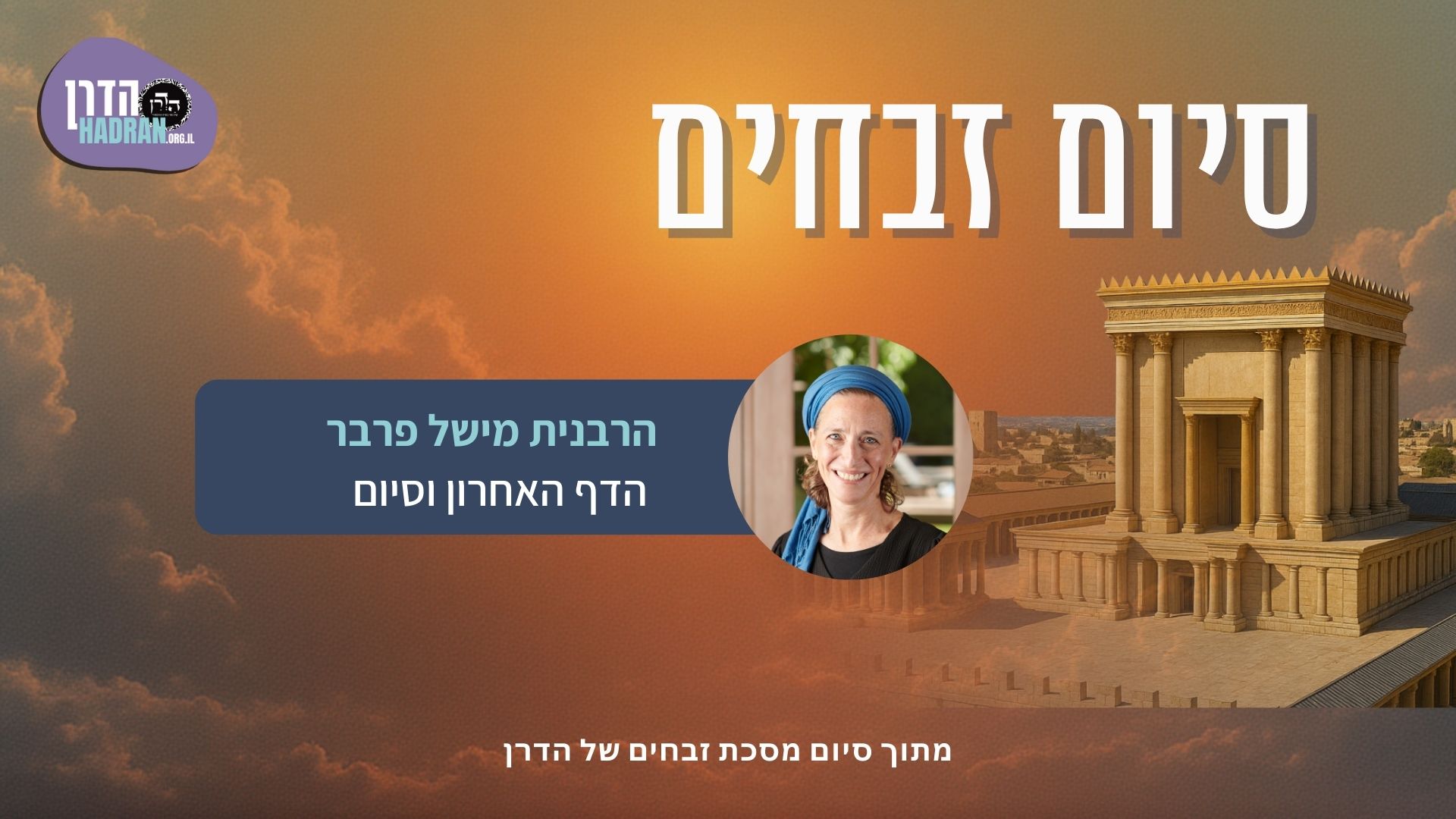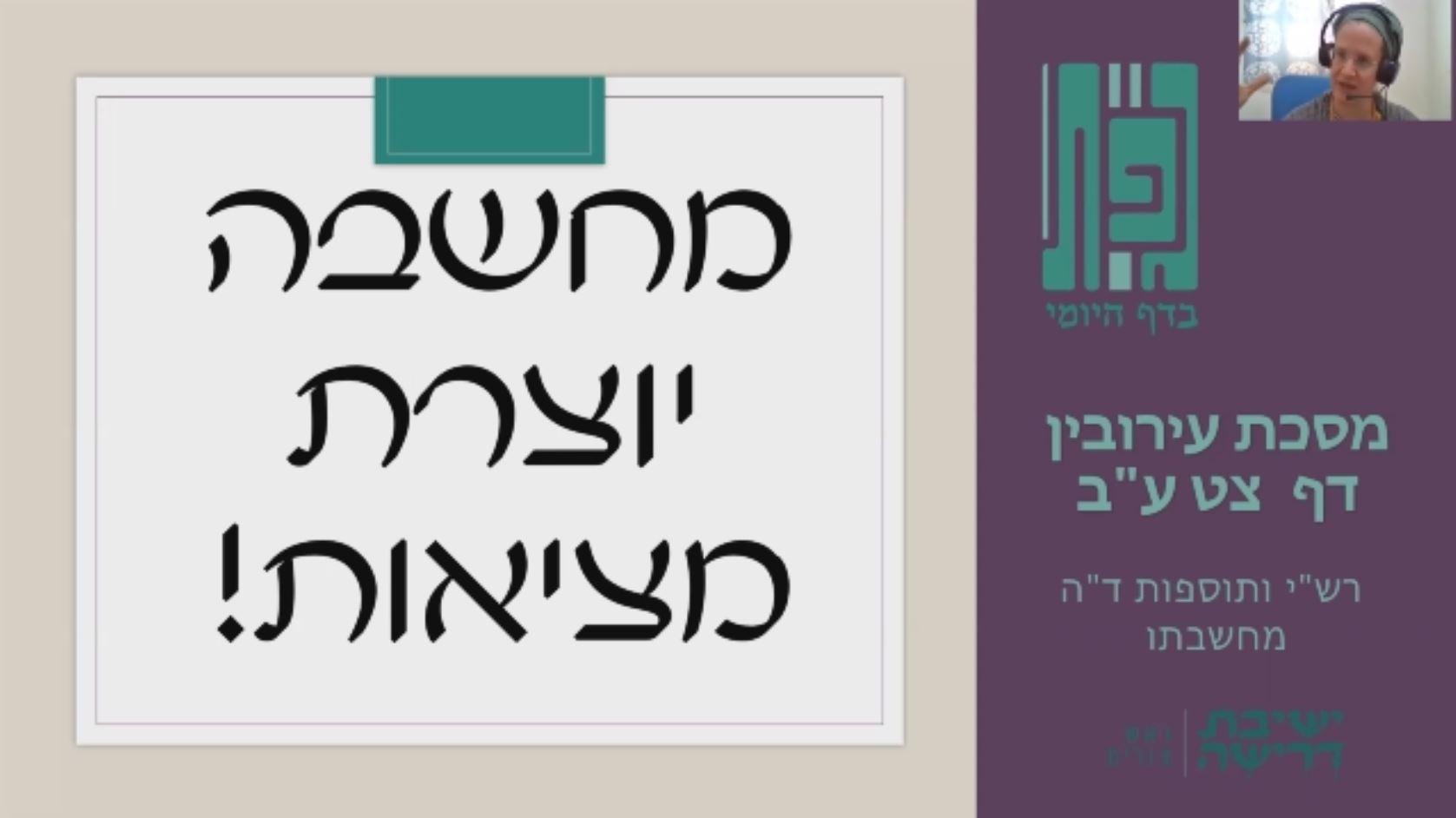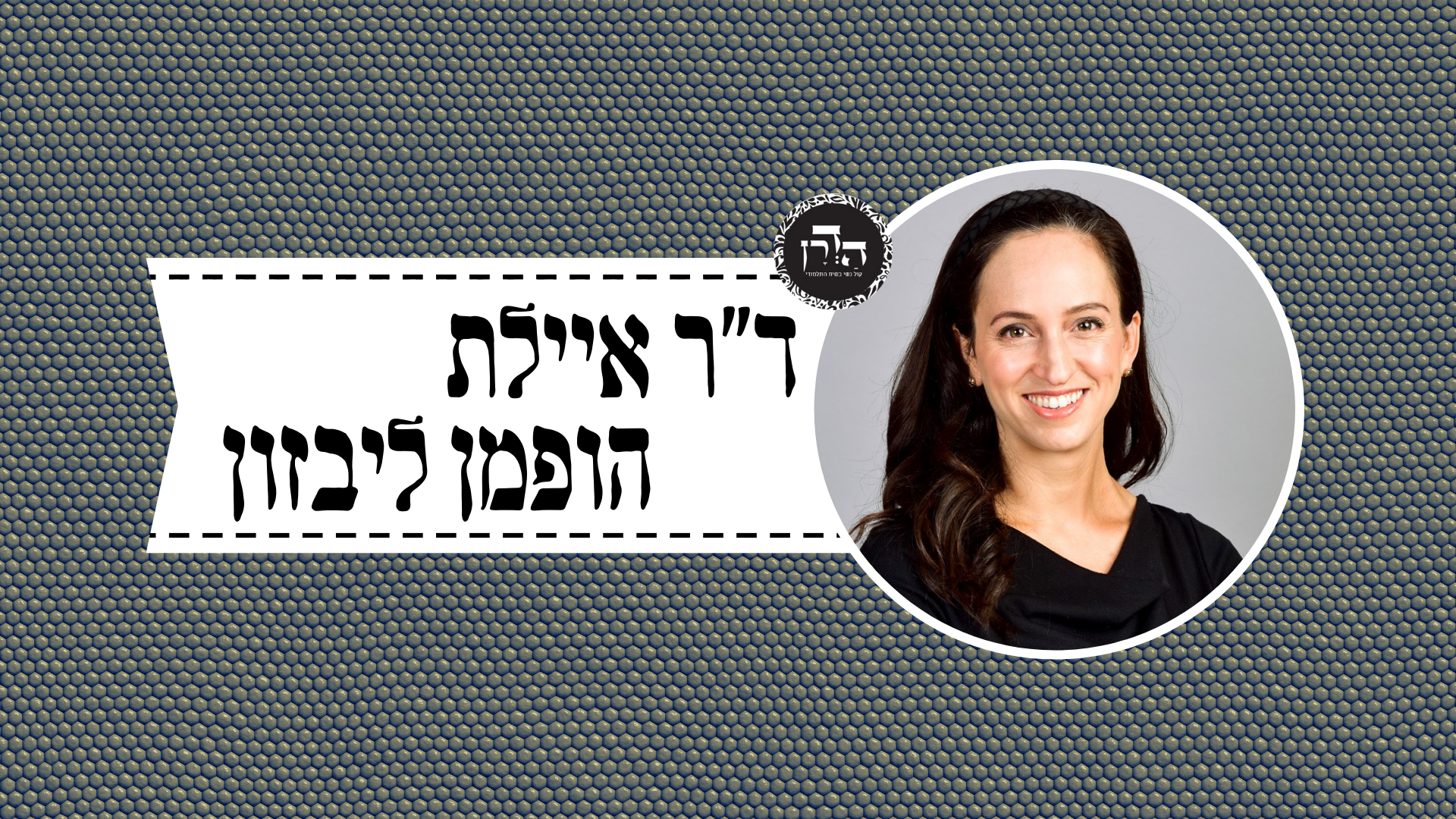פטר חמור צריך לפדות השה ולהעביר את השה לכהן. באיזה מקרים מישהו פטור מדין פטר חמור בגלל שיש לעכו”ם קשר מסויים לבהמה (כל מיני מקרים שונים מוזכרים)? תוך כדי, מוזכר איסור מכירה בהמות גסות לעכו”ם. ממה נובע איסור זה ובאיזה מקרים שייך/לא שייך האיסור?
הלימוד החודש מוקדש לרפואת פיליס הכט, גיטל פעשא בת מאשה רחל על ידי חברותיה הרבות שאוהבות ומעריכות אותה.
רוצה להקדיש שיעור?

כלים
הלימוד החודש מוקדש לרפואת פיליס הכט, גיטל פעשא בת מאשה רחל על ידי חברותיה הרבות שאוהבות ומעריכות אותה.
כלים
העמקה
רוצה להבין מה באמת קורה מתחת לפני השטח של הסוגיה?
שיעורים, פודקאסטים והרחבות של מיטב המורות שלנו יפתחו לך עוד זוויות וכיווני חשיבה.
חדשה בלימוד הגמרא?
זה הדף הראשון שלך? איזו התרגשות עצומה! יש לנו בדיוק את התכנים והכלים שיעזרו לך לעשות את הצעדים הראשונים ללמידה בקצב וברמה שלך, כך תוכלי להרגיש בנוח גם בתוך הסוגיות המורכבות ומאתגרות.
פסיפס הלומדות שלנו
גלי את קהילת הלומדות שלנו, מגוון נשים, רקעים וסיפורים. כולן חלק מתנועה ומסע מרגש ועוצמתי.
בכורות ב
מַתְנִי׳ הַלּוֹקֵחַ עוּבַּר חֲמוֹרוֹ שֶׁל נָכְרִי, וְהַמּוֹכֵר לוֹ, אַף עַל פִּי שֶׁאֵינוֹ רַשַּׁאי, הַמִּשְׁתַּתֵּף לוֹ, וְהַמְקַבֵּל הֵימֶנּוּ, וְהַנּוֹתֵן לוֹ בְּקַבָּלָה — פָּטוּר מִן הַבְּכוֹרָה, שֶׁנֶּאֱמַר: ״בְּיִשְׂרָאֵל״, אֲבָל לֹא בַּאֲחֵרִים.
MISHNA: With regard to one who purchases the fetus of a donkey that belongs to a gentile, and one who sells the fetus of his donkey to a gentile although he is not permitted to sell a large animal to a gentile, and one who enters into a partnership with a gentile in ownership of a donkey or its fetus, and one who receives a donkey from a gentile in order to care for it in exchange for partnership in its offspring, and one who gives his donkey to a gentile in receivership, in all of these cases the donkeys are exempt from the obligations of firstborn status, i.e., they do not have firstborn status and are not redeemed, as it is stated: “I sanctified to Me all the firstborn in Israel, both man and animal” (Numbers 3:13), indicating that the mitzva is incumbent upon the Jewish people, but not upon others. If the firstborn belongs even partially to a gentile, it does not have firstborn status.
גְּמָ׳ כׇּל הָנֵי לְמָה לִי?
GEMARA: The Gemara asks: Why do I need all these examples in the mishna to demonstrate the principle that a firstborn donkey must belong exclusively to a Jew for the obligations of firstborn status to apply?
צְרִיכִי, דְּאִי תְּנָא לוֹקֵחַ — הֲוָה אָמֵינָא מִשּׁוּם דְּקָא מַיְיתֵי לַהּ לִקְדוּשָּׁה, אֲבָל מוֹכֵר דְּקָא מַפְקַע לַהּ מִקְּדוּשָּׁה — אֵימָא לִיקְנְסֵיהּ, קָא מַשְׁמַע לַן.
The Gemara explains: All of these examples are necessary. As, had the tanna taught that a donkey is exempt from the obligations of firstborn status only in the case where a Jew purchases a fetus from a gentile, I would say that this is because the Jew brings it to a state of sanctity in that it will not be worked on Shabbat. But in the case where a Jew sells the fetus of his donkey to a gentile, where he abrogates its state of sanctity, I would say that the Sages should penalize him [likneseih] for his actions by rendering the fetus subject to the obligations of firstborn status. Therefore, the mishna teaches us that it is exempt from these obligations.
וְהַמִּשְׁתַּתֵּף לוֹ, לְמָה לִי? לְאַפּוֹקֵי מִדְּרַבִּי יְהוּדָה, דְּאָמַר: שׁוּתָּפוּת גּוֹיִ חַיֶּיבֶת בִּבְכוֹרָה, קָמַשְׁמַע לַן דִּפְטוּרָה מִן הַבְּכוֹרָה.
And why do I need the mishna to state the case of one who enters into a partnership with a gentile? The case is necessary to exclude the opinion of Rabbi Yehuda, who says: An animal owned in partnership with a gentile is obligated, i.e., subject to accounting its offspring a firstborn. Therefore, the mishna teaches us that it is exempt from its offspring being counted a firstborn.
וְהַמְקַבֵּל, לְמָה לִי? מִשּׁוּם דְּקָא בָּעֵי לְמִיתְנֵי וְהַנּוֹתֵן לוֹ בְּקַבָּלָה.
And why do I need the mishna to state that the fetus does not have firstborn status in the case of one who receives a donkey from a gentile in exchange for partnership in its offspring? This halakha is already included in the previous one. The Gemara answers: It is because the tanna wants to teach in the parallel case of: And one who gives his donkey to a gentile in receivership, that its offspring does not have firstborn status.
וְהַנּוֹתֵן לוֹ בְּקַבָּלָה, לְמָה לִי? אִיצְטְרִיךְ, סָלְקָא דַּעְתָּךְ אָמֵינָא: הוֹאִיל וְעִיקַּר בְּהֵמָה דְּיִשְׂרָאֵל הִיא, לִיקְנְסֵיהּ, דִּלְמָא אָתֵי לְאִיחַלּוֹפֵי בִּבְהֵמָה אַחֲרִיתִי, קָמַשְׁמַע לַן.
And why do I need the case of one who gives his donkey to a gentile in receivership to be stated? It was necessary, because it might enter your mind to say that since the primary animal belongs to the Jew, the Sages should penalize him by treating the offspring as a firstborn and requiring it to be redeemed, lest this case be confused with another case of an animal that the Jew puts in the care of a gentile where the gentile does not own rights to the offspring, and the offspring is counted a firstborn. Therefore, the mishna teaches us that he is not penalized.
תְּנַן הָתָם: רַבִּי יְהוּדָה מַתִּיר בַּשְּׁבוּרָה, בֶּן בְּתִירָא מַתִּיר בַּסּוּס.
§ The Gemara cites a discussion where the mishna is used as a proof: We learned in a mishna elsewhere (Avoda Zara 14b) with regard to the prohibition against selling large livestock to a gentile due to concern that it will be worked on Shabbat: Rabbi Yehuda deems the sale of a damaged animal permitted because it is incapable of performing labor, and ben Beteira deems the sale of a horse for riding permitted, because riding a horse on Shabbat is not prohibited by Torah law.
אִיבַּעְיָא לְהוּ: עוּבָּר מָה לִי אָמַר רַבִּי יְהוּדָה? טַעְמָא דְּרַבִּי יְהוּדָה הָתָם דְּשָׁרֵי, מִשּׁוּם דִּשְׁבוּרָה, עוּבָּר נָמֵי שָׁבוּר הוּא. אוֹ דִלְמָא: שְׁבוּרָה לָאו הַיְינוּ אוֹרְחֵיהּ, אֲבָל עוּבָּר, כֵּיוָן דְּהַיְינוּ אוֹרְחֵיהּ, לָאו שָׁבוּר הוּא?
A dilemma was raised before the Sages: With regard to a fetus, what would Rabbi Yehuda say to me about selling it to a gentile? Is the reason that Rabbi Yehuda deems selling the animal permitted there because it is damaged and it cannot work, and a fetus is also damaged in the sense that it cannot work? Or, perhaps it is permitted to sell a damaged animal because that is not its natural state; it is defective and is therefore not included in the prohibition against selling large livestock. But with regard to a fetus, since that is its natural state, and it will become capable of working after growing up, perhaps it is not considered damaged, as it is not defective.
תָּא שְׁמַע: וְהַמּוֹכֵר לוֹ, אַף עַל פִּי שֶׁאֵינוֹ רַשַּׁאי. וְלָא פְּלִיג רַבִּי יְהוּדָה.
The Gemara suggests: Come and hear a resolution to the dilemma from the mishna: And one who sells the fetus of his donkey to a gentile, his donkey is exempt from the obligations of firstborn status, although the owner is not permitted to do so. And Rabbi Yehuda does not disagree and claim that he may sell it. Apparently, Rabbi Yehuda agrees that it is prohibited to sell the fetus of one’s animal to a gentile.
וְלִיטַעְמָיךְ, הַמִּשְׁתַּתֵּף לוֹ, וְהַמְקַבֵּל מִמֶּנּוּ, וְהַנּוֹתֵן לוֹ בְּקַבָּלָה, דְּלָא קָתָנֵי — הָכִי נָמֵי דְּלָא פְּלִיג?
The Gemara rejects the resolution: And according to your reasoning, concerning the other cases in the mishna, namely, one who enters into a partnership with a gentile, and one who receives a donkey from a gentile in exchange for partnership in its offspring, and one who gives his donkey to a gentile in receivership, with regard to which the mishna does not teach that Rabbi Yehuda disagrees, so too does this indicate that he does not disagree with the ruling in the mishna in these cases? That is impossible, as Rabbi Yehuda holds that an animal subject to a partnership between a Jew and gentile is subject to accounting its offspring a firstborn, as is evident from a baraita that will soon be cited.
אֶלָּא — פְּלִיג, וְלָא קָתָנֵי. הָכָא נָמֵי — פְּלִיג, וְלָא קָתָנֵי.
Rather, clearly Rabbi Yehuda does disagree, but the mishna does not teach his opinion. Here too, with regard to selling the fetus, he disagrees, but the mishna does not teach his opinion.
תָּא שְׁמַע: רַבִּי יְהוּדָה אוֹמֵר, הַמְקַבֵּל בְּהֵמָה מִן הַגּוֹי וְיָלְדָה — מַעֲלִין אוֹתוֹ בְּשׇׁוְויוֹ, וְנוֹתֵן חֲצִי דָּמָיו לַכֹּהֵן. וְהַנּוֹתֵן לוֹ בְּקַבָּלָה, אַף עַל פִּי שֶׁאֵינוֹ רַשַּׁאי — קוֹנְסִים אוֹתוֹ עַד עֲשָׂרָה בְּדָמָיו, וְנוֹתֵן כׇּל דָּמָיו לַכֹּהֵן.
The Gemara suggests: Come and hear a resolution from a baraita: Rabbi Yehuda says that in the case of one who receives an animal from a gentile in order to care for it and receives some of the offspring in exchange for his work, and it gave birth to a firstborn, they assess its value, and the Jew gives half of its value to the priest to redeem his portion, which is sanctified by the firstborn status. And in the case of one who gives the gentile an animal in receivership even though he is not permitted to do so, the Sages penalize him by requiring that he purchase the gentile’s portion of the animal for up to ten times its value, and he gives all of its value to the priest.
מַאי לָאו אַעוּבָּר? לָא, אַבְּהֵמָה.
What, is it not referring to the fetus when the baraita states that he is not permitted to sell it? The Gemara responds: No, it is referring to the animal itself that he may not sell to the gentile, and that is why he is penalized.
וְהָא ״דָּמָיו״ קָתָנֵי! תְּנִי ״דָּמֶיהָ״. וְהָא ״נוֹתֵן כׇּל דָּמָיו לַכֹּהֵן״ קָתָנֵי, וְאִי בְּהֵמָה — כֹּהֵן מַאי עֲבִידְתֵּיהּ? הָכָא בְּמַאי עָסְקִינַן — כְּגוֹן דְּיָהֵיב לֵיהּ בְּהֵמָה מְעַבַּרְתָּא לְפַטּוֹמַהּ, דְּמִיגּוֹ דְּקָנְסִינַן לֵיהּ אַבְּהֵמָה, קָנְסִינַן לֵיהּ אַעוּבָּר.
The Gemara asks: But doesn’t the baraita teach: The Sages penalize him up to ten times its value [damav], in masculine form, indicating that it is referring to the fetus and not the mother? The Gemara responds: Teach the following wording in the baraita: The Sages penalize him up to ten times its value [dameha], in feminine form. The Gemara asks: But doesn’t it teach: He gives all of its value to the priest? And if it is referring to the animal and not the firstborn, what is the relevance of the priest? The Gemara answers: Here we are dealing with a case where the Jew gave the gentile a pregnant animal to fatten it in order to divide the profits as well as the offspring. Since we penalize him for selling the animal in a prohibited manner, we penalize him with regard to the fetus as well.
אָמַר רַב אָשֵׁי: תָּא שְׁמַע, רַבִּי יְהוּדָה מַתִּיר בַּשְּׁבוּרָה, מִפְּנֵי שֶׁאֵינָהּ יְכוֹלָה לְהִתְרַפְּאוֹת. הָא יְכוֹלָה לְהִתְרַפְּאוֹת — אָסַר, וְהָא עוּבָּר נָמֵי כְּיָכוֹל לְהִתְרַפְּאוֹת דָּמֵי. שְׁמַע מִינַּהּ.
Rav Ashi says: Come and hear a resolution from a baraita: Rabbi Yehuda deems the sale to a gentile of a damaged animal permitted, because it is incapable of being cured. This statement indicates that if it is capable of being cured, Rabbi Yehuda deems its sale prohibited. And a fetus is also similar to one who is able to be cured, as it ultimately will be capable of working. Learn from it that Rabbi Yehuda deems the sale of a fetus to a gentile prohibited.
וְאִיכָּא דְּמַתְנֵי לַהּ אַמַּתְנִיתִין, וְהַמּוֹכֵר לוֹ, אַף עַל פִּי שֶׁאֵינוֹ רַשַּׁאי. לֵימָא מַתְנִיתִין דְּלָא כְּרַבִּי יְהוּדָה, דִּתְנַן: רַבִּי יְהוּדָה מַתִּיר בַּשְּׁבוּרָה!
And there are those who teach this discussion as referring to the statement in the mishna: With regard to one who sells the fetus of his donkey to a gentile, although he is not permitted to sell a large animal to a gentile, it is exempt from the obligations of firstborn status. The discussion then proceeded as follows: Let us say that the mishna is not in accordance with the opinion of Rabbi Yehuda, as we learned in a mishna (Avoda Zara 14b): Rabbi Yehuda deems the sale of a damaged animal permitted because it is incapable of performing labor. The halakha is presumably the same with regard to a fetus, which is also not capable of performing labor.
אֲפִילּוּ תֵּימָא רַבִּי יְהוּדָה — שְׁבוּרָה, לָאו הַיְינוּ אוֹרְחֵיהּ; עוּבָּר, הַיְינוּ אוֹרְחֵיהּ.
The Gemara responds: You may even say that it is in accordance with the opinion of Rabbi Yehuda, as it is permitted to sell a damaged animal because that is not its natural state; it is defective and is therefore not included in the prohibition against selling large livestock. But with regard to a fetus, since it is in its natural state, and will become capable of working after growing up, perhaps it is not considered damaged, as it is not defective.
תָּא שְׁמַע: רַבִּי יְהוּדָה אוֹמֵר: הַמְקַבֵּל בְּהֵמָה מִן הַגּוֹי וְיָלְדָה — מַעֲלִין אוֹתוֹ בְּשׇׁוְיוֹ, וְנוֹתֵן חֲצִי דָּמָיו לַכֹּהֵן. וְהַנּוֹתֵן לוֹ בְּקַבָּלָה, אַף עַל פִּי שֶׁאֵינוֹ רַשַּׁאי — קוֹנְסִין אוֹתוֹ עַד עֲשָׂרָה בְּדָמָיו, וְנוֹתֵן כׇּל דָּמָיו לַכֹּהֵן. מַאי לָאו אַעוּבָּר? לָא, אַבְּהֵמָה.
The Gemara suggests: Come and hear another proof from a baraita: Rabbi Yehuda says that in the case of one who receives an animal from a gentile to care for and receives a portion of the offspring in exchange for his work, and it gave birth to a firstborn, they assess its value, and the Jew gives half of its value to the priest to redeem his portion, which is sanctified by the firstborn status. And in the case of one who gives the gentile an animal in receivership even though he is not permitted to do so, the Sages penalize him by requiring that he purchase the gentile’s portion of the animal for up to ten times its value, and he gives all of its value to the priest. What, is it not referring to the fetus when the baraita states that he is not permitted to sell it? The Gemara responds: No, it is referring to the animal itself that he may not sell to the gentile, and that is why he is penalized.
וְהָא דָּמָיו קָתָנֵי! תְּנִי ״דָּמֶיהָ״. וְהָא ״נוֹתֵן כָּל דָּמָיו לַכֹּהֵן״ קָתָנֵי, וְאִי בְּהֵמָה — כֹּהֵן מַאי עֲבִידְתֵּיהּ? הָכָא בְּמַאי עָסְקִינַן — כְּגוֹן דְּיָהֵיב בְּהֵמָה מְעַבַּרְתָּא לְפַטּוֹמַהּ, דְּמִיגּוֹ דְּקָנְסִינַן לֵיהּ אַבְּהֵמָה — קָנְסִינַן לֵיהּ אַעוּבָּר.
The Gemara asks: But doesn’t the baraita teach: The Sages penalize him up to ten times its value [damav], in masculine form, indicating that it is referring to the fetus and not the mother? The Gemara responds: Teach the following wording in the baraita: The Sages penalize him up to ten times its value [dameha], in feminine form. The Gemara asks: But doesn’t it teach: He gives all of its value to the priest? And if it is referring to the animal and not the firstborn, what is the relevance of the priest? The Gemara answers: Here we are dealing with a case where the Jew gave the gentile a pregnant animal to fatten it in order to divide the profits as well as the offspring. Since we penalize him for selling the animal in a prohibited manner, we penalize him with regard to the fetus as well.
אָמַר רַב אָשֵׁי, תָּא שְׁמַע: רַבִּי יְהוּדָה מַתִּיר בַּשְּׁבוּרָה, מִפְּנֵי שֶׁאֵינָהּ יְכוֹלָה לְהִתְרַפְּאוֹת. הָא יְכוֹלָה לְהִתְרַפְּאוֹת — אָסוּר, וְהַאי נָמֵי כְּיָכוֹל לְהִתְרַפְּאוֹת דָּמֵי. שְׁמַע מִינַּהּ.
Rav Ashi says: Come and hear a resolution from a baraita: Rabbi Yehuda deems the sale to a gentile of a damaged animal permitted, because it is incapable of being cured. This statement indicates that if it is capable of being cured, Rabbi Yehuda deems its sale prohibited. And this fetus is also similar to one who is able to be cured, as it ultimately will be capable of working. Learn from it that Rabbi Yehuda deems the sale of a fetus to a gentile prohibited.
אִיבַּעְיָא לְהוּ: מָכַר בְּהֵמָה לְעוּבָּרֶיהָ, מַאי? תִּיבְּעֵי לְרַבִּי יְהוּדָה, תִּיבְּעֵי לְרַבָּנַן.
§ A dilemma was raised before the Sages concerning the prohibition against selling large livestock to a gentile: In the case of a Jew who sold an animal to a gentile only with regard to rights to its fetuses, but retained ownership of the animal itself, what is the halakha concerning the permissibility of the sale? The Gemara clarifies: Let the dilemma be raised according to the opinion of Rabbi Yehuda, who permits the sale of a damaged animal, and let the dilemma be raised according to the opinion of the Rabbis, who dispute that ruling.
תִּיבְּעֵי לְרַבִּי יְהוּדָה: עַד כָּאן לָא קָא שָׁרֵי רַבִּי יְהוּדָה אֶלָּא בִּשְׁבוּרָה, דְּלָא אָתְיָא לְאִיחַלּוֹפֵי, אֲבָל שְׁלֵמָה דְּאָתְיָא לְאִיחַלּוֹפֵי — אָסַר.
The Gemara elaborates: Let the dilemma be raised according to the opinion of Rabbi Yehuda, as follows: Perhaps Rabbi Yehuda permits only the sale of a damaged animal, as people will not come to confuse this animal with a healthy animal, which is prohibited for sale to a gentile, as they are visibly different. But in the case of one who sells an unblemished animal with regard to the rights to its fetuses, which people may come to confuse with the case of selling the animal entirely and consider that sale permitted as well, Rabbi Yehuda deems the sale prohibited.
אוֹ דִלְמָא, וּמָה שְׁבוּרָה דִּפְסַקָה מִינֵּיהּ, וְכׇל שֶׁכֵּן שְׁלֵמָה דְּלָא פְּסַקָה מִינֵּיהּ?
Or perhaps Rabbi Yehuda would claim that in the case of a damaged animal, which is separated from him in its entirety in the sale, the sale is permitted, and all the more so with regard to the sale of an unblemished animal with regard to the rights to its fetuses, where the animal is not entirely separated from him, as he did not sell the actual animal, the sale is permitted.
תִּיבְּעֵי לְרַבָּנַן: עַד כָּאן לָא קָאָסְרִי רַבָּנַן אֶלָּא בִּשְׁבוּרָה, דִּפְסַקָה מִינֵּיהּ, אֲבָל שְׁלֵמָה דְּלָא פְּסַקָה מִינֵּיהּ — שָׁרוּ.
Likewise, the dilemma can be raised according to the opinion of the Rabbis: Perhaps the Rabbis deemed the sale prohibited only in a case of a damaged animal, as the animal is separated from him. But in the case of an unblemished animal that is sold only with regard to the fetuses, where it is not separated from him, and there is no concern that people will mistakenly sell the entire animal to a gentile, they deem the sale permitted.
אוֹ דִלְמָא: וּמָה שְׁבוּרָה דְּלָא אָתְיָא לְאִיחַלּוֹפֵי — אָסְרִי, וְכׇל שֶׁכֵּן שְׁלֵמָה דְּאָתְיָא לְאִיחַלּוֹפֵי.
Or perhaps the Rabbis would claim that in the case of a damaged animal, which people will not come to confuse with the case of an unblemished animal, the Rabbis deem the sale prohibited, and all the more so they would prohibit selling an unblemished animal with regard to the rights to its fetuses, which people may come to confuse with the case of selling an unblemished animal in its entirety.
וְטַעְמָא דְרַבָּנַן מִשּׁוּם הָכִי הוּא? וְהָתַנְיָא: אָמְרוּ לוֹ לְרַבִּי יְהוּדָה: וַהֲלֹא מַרְבִּיעִין עָלֶיהָ וְיוֹלֶדֶת! אַלְמָא מִשּׁוּם עוּבָּרֶיהָ הוּא.
The Gemara asks: And is the reason of the opinion of the Rabbis due to that concern that people may confuse the sale of a damaged animal with the sale of an unblemished animal in its entirety? But isn’t it taught in a baraita that the Rabbis said to Rabbi Yehuda: But why do you hold that is it permitted to sell a damaged animal? Don’t they breed it with another animal, and it gives birth to offspring, which will then be owned by a gentile? Apparently, the reason the Rabbis prohibit the sale is due to the animal’s fetuses. If so, they should prohibit selling large livestock to a gentile with regard to the fetuses as well.
הָכִי קָאָמְרִי לֵיהּ: טַעְמָא דִידַן מִשּׁוּם דְּאָתְיָא לְאִיחַלּוֹפֵי בִּבְהֵמָה, אֶלָּא אַתְּ, מַאי טַעְמָא שָׁרֵית? מִשּׁוּם דְּאֵין יְכוֹלָה לְהִתְרַפְּאוֹת, כְּמַאן דְּזַבְּנַהּ לִשְׁחִיטָה דָּמֵי.
The Gemara answers: This is not truly the Rabbis’ opinion. Rather, this is what they were saying to Rabbi Yehuda: Our reason for prohibiting the sale of a damaged animal is because people might come to confuse this case with the sale of an unblemished animal. But you, what is the reason that you permit selling a damaged animal? It is because the animal is incapable of being cured, and you therefore consider it similar to one who sold an animal explicitly for slaughter, which is permitted.
וַהֲלֹא מַרְבִּיעִין עָלֶיהָ וְיוֹלֶדֶת, וְכֵיוָן דְּמַרְבִּיעִין עָלֶיהָ וְיוֹלֶדֶת — מְשַׁהֵא לַהּ!
But actually it is not similar to that case, as don’t they breed a damaged animal with another animal, and it gives birth? And since they breed it and it gives birth, the gentile will delay its slaughter. Others may then mistakenly believe that selling large livestock for purposes other than slaughter is permitted.
וַאֲמַר לְהוּ: לִכְשֶׁתֵּלֵד, דְּלֹא מְקַבֶּלֶת זָכָר.
And Rabbi Yehuda said to the Rabbis in response: When a damaged animal actually gives birth, I will concern myself with this possibility. Practically, this concern may be disregarded, as such an animal cannot breed with a male. In any event, no proof may be brought from this baraita concerning the opinion of the Rabbis concerning selling an animal with regard to the rights to its fetuses.
תָּא שְׁמַע, וְהַנּוֹתֵן לוֹ בְּקַבָּלָה, וְלָא קָתָנֵי: ״אַף עַל פִּי שֶׁאֵינוֹ רַשַּׁאי״!
The Gemara suggests: Come and hear a proof from the mishna, where it states: And in the case of one who gives his donkey to a gentile in receivership, meaning that he divides the offspring with him in exchange for caring for the animal, the donkey is exempt from the obligations of firstborn status. This case is identical to that of selling an animal with regard to the rights to its fetuses, and the mishna does not teach: Although he is not permitted to do so. Apparently such a sale is permitted.
וְלִיטַעְמָיךְ, הַמִּשְׁתַּתֵּף לוֹ דְּלָא קָתָנֵי, הָכִי נָמֵי דְּרַשַּׁאי? וְהָא אָמַר אֲבוּהּ דִּשְׁמוּאֵל: אָסוּר לְאָדָם שֶׁיַּעֲשֶׂה שׁוּתָּפוּת עִם הַגּוֹי, שֶׁמָּא יִתְחַיֵּיב לוֹ שְׁבוּעָה וְנִשְׁבָּע לוֹ בְּשֵׁם עֲבוֹדָה זָרָה שֶׁלּוֹ, וְהַתּוֹרָה אָמְרָה: ״לֹא יִשָּׁמַע עַל פִּיךָ״!
The Gemara responds: But according to your reasoning, with regard to that which the mishna states: One who enters into a partnership with a gentile, where it also does not teach: Although he is not permitted to do so, so too, should it be derived that it is permitted to enter into such a partnership? But doesn’t Shmuel’s father say: It is prohibited for a person to enter into a partnership with a gentile lest their joint ventures lead them to quarrel and his gentile partner will be obligated to take an oath to him and he will take an oath in the name of his object of idol worship; and the Torah states: “Neither let it be heard out of your mouth” (Exodus 23:13), which includes causing a gentile to take an oath in the name of an idol.
אֶלָּא, תְּנָא מְכִירָה, וְהוּא הַדִּין לְשׁוּתָּפוּת. הָכִי נָמֵי, תְּנָא מְכִירָה וְהוּא הַדִּין לְקַבְּלָנוּת. וּמַאי שְׁנָא מְכִירָה דְּנָקֵט? דְּעִיקָּר מְכִירָה הִיא.
Rather, the tanna taught that a sale to a gentile is not permitted, and the same is true for the case of a partnership. So too, the tanna taught that a sale to a gentile is prohibited, and the same is true for a case of receivership. The Gemara asks: And what is different about the case of selling that the tanna cited the prohibition specifically in that case? The Gemara answers that the primary prohibition is that of selling the animal to a gentile.
תָּא שְׁמַע: רַבִּי יְהוּדָה אוֹמֵר, הַמְקַבֵּל בְּהֵמָה מִן הַגּוֹי וְיָלְדָה — מַעֲלִין אוֹתוֹ בְּשׇׁוְויוֹ, וְנוֹתֵן חֲצִי דָּמָיו לַכֹּהֵן. וְהַנּוֹתֵן בְּקַבָּלָה, אַף עַל פִּי שֶׁאֵינוֹ רַשַּׁאי — קוֹנְסִין אוֹתוֹ עַד עֲשָׂרָה בְּדָמָיו, וְנוֹתֵן כָּל דָּמָיו לַכֹּהֵן.
The Gemara suggests: Come and hear a resolution to the dilemma of whether selling an animal to a gentile with regard to the rights to its fetuses is permitted from a baraita: Rabbi Yehuda says that in the case of one who receives an animal from a gentile to care for and receives a portion of the offspring in exchange for his work, and it gave birth to a firstborn, they assess its value, and the Jew gives half of its value to the priest to redeem his portion, which is considered to have the sanctity of a firstborn. And in the case of one who gives the gentile an animal in receivership even though he is not permitted to do so, the Sages penalize him by requiring that he purchase the gentile’s portion of the animal for up to ten times its value, and he gives all of its value to the priest.
וַחֲכָמִים אוֹמְרִים: כׇּל זְמַן שֶׁיַּד הַגּוֹי בָּאֶמְצַע — פְּטוּרָה מִן הַבְּכוֹרָה.
And the Rabbis say: As long as the ownership of the gentile is involved, in that he possesses at least partial ownership of the mother or the fetus, the animal is exempt from its offspring being counted a firstborn.







































